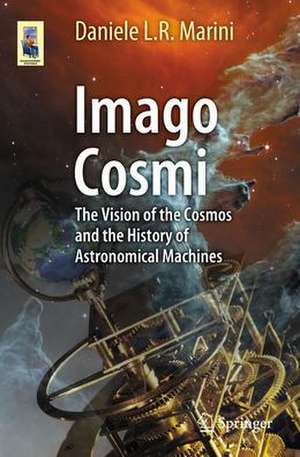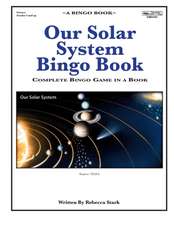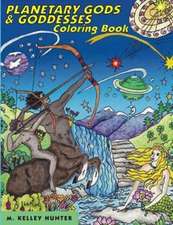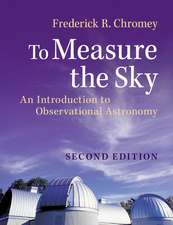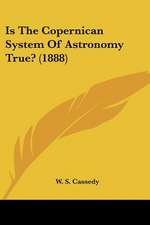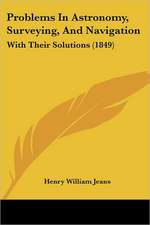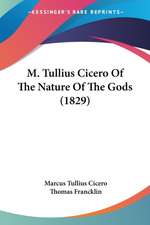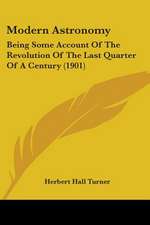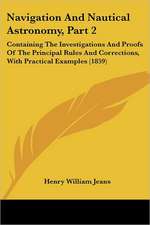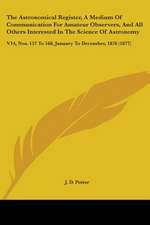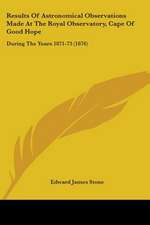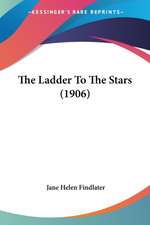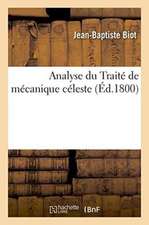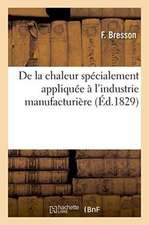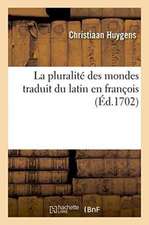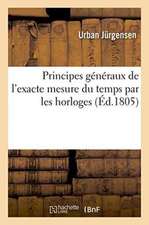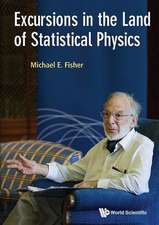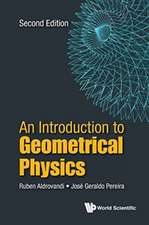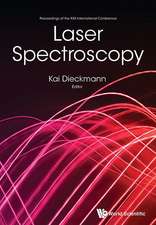Imago Cosmi: The Vision of the Cosmos and the History of Astronomical Machines: Astronomers' Universe
Autor Daniele L. R. Marinien Limba Engleză Paperback – 8 sep 2023
Special attention is given to the instruments used by ancient astronomers, including the most important astronomical clocks and planetary machines. In light of this, the author examines Kepler's almost unknown design of a planetary machine and offers an interpretation using virtual reality techniques.
The book also highlights the Chinese view of the Cosmos and the evolution of its astronomy and astronomical machines, offering readers a unique perspective and insight intothe relationship between astronomy and technology in different cultures.
Finally, the author provides a practical approach to understanding the construction and mechanics of astronomical machines, exploring the process of designing and manufacturing a Tellurium.
The reading is enriched with short videos of the Tellurium, along with a translation of the description of the planetary machine by Christiaan Huygens. In addition, it provides a unique glimpse into the religious influences on astronomical studies during the mid-1700s through the translation of Johann Albrecht Bengel's book Cyclus.
This book is a must-read for anyone interested in the history of science and technology. It appeals to astronomers, mathematicians, physicists, and historians of science and technology alike, providing fascinating descriptions and insightful analysis of the vision of the Cosmos from its earliest conceptions to the present day.
Din seria Astronomers' Universe
-
 Preț: 210.44 lei
Preț: 210.44 lei -
 Preț: 207.15 lei
Preț: 207.15 lei -
 Preț: 195.53 lei
Preț: 195.53 lei -
 Preț: 254.90 lei
Preț: 254.90 lei -
 Preț: 284.56 lei
Preț: 284.56 lei -
 Preț: 212.88 lei
Preț: 212.88 lei -
 Preț: 256.41 lei
Preț: 256.41 lei -
 Preț: 264.35 lei
Preț: 264.35 lei -
 Preț: 259.08 lei
Preț: 259.08 lei -
 Preț: 227.61 lei
Preț: 227.61 lei -
 Preț: 277.98 lei
Preț: 277.98 lei -
 Preț: 305.70 lei
Preț: 305.70 lei -
 Preț: 253.11 lei
Preț: 253.11 lei -
 Preț: 216.60 lei
Preț: 216.60 lei -
 Preț: 272.24 lei
Preț: 272.24 lei -
 Preț: 330.75 lei
Preț: 330.75 lei -
 Preț: 179.00 lei
Preț: 179.00 lei -
 Preț: 289.83 lei
Preț: 289.83 lei -
 Preț: 160.03 lei
Preț: 160.03 lei -
 Preț: 200.80 lei
Preț: 200.80 lei -
 Preț: 255.97 lei
Preț: 255.97 lei -
 Preț: 242.58 lei
Preț: 242.58 lei -
 Preț: 262.55 lei
Preț: 262.55 lei -
 Preț: 282.38 lei
Preț: 282.38 lei -
 Preț: 187.82 lei
Preț: 187.82 lei -
 Preț: 225.19 lei
Preț: 225.19 lei -
 Preț: 207.64 lei
Preț: 207.64 lei -
 Preț: 104.35 lei
Preț: 104.35 lei -
 Preț: 188.94 lei
Preț: 188.94 lei -
 Preț: 270.50 lei
Preț: 270.50 lei -
 Preț: 212.01 lei
Preț: 212.01 lei -
 Preț: 169.08 lei
Preț: 169.08 lei -
 Preț: 210.01 lei
Preț: 210.01 lei -
 Preț: 208.26 lei
Preț: 208.26 lei -
 Preț: 253.98 lei
Preț: 253.98 lei -
 Preț: 180.12 lei
Preț: 180.12 lei -
 Preț: 280.19 lei
Preț: 280.19 lei -
 Preț: 273.13 lei
Preț: 273.13 lei -
 Preț: 207.39 lei
Preț: 207.39 lei -
 Preț: 208.70 lei
Preț: 208.70 lei -
 Preț: 214.86 lei
Preț: 214.86 lei -
 Preț: 188.94 lei
Preț: 188.94 lei -
 Preț: 194.65 lei
Preț: 194.65 lei -
 Preț: 277.34 lei
Preț: 277.34 lei -
 Preț: 187.15 lei
Preț: 187.15 lei -
 Preț: 210.93 lei
Preț: 210.93 lei -
 Preț: 212.01 lei
Preț: 212.01 lei
Preț: 227.38 lei
Nou
Puncte Express: 341
Preț estimativ în valută:
43.51€ • 47.25$ • 36.55£
43.51€ • 47.25$ • 36.55£
Carte disponibilă
Livrare economică 01-15 aprilie
Livrare express 18-22 martie pentru 47.85 lei
Preluare comenzi: 021 569.72.76
Specificații
ISBN-13: 9783031309434
ISBN-10: 303130943X
Pagini: 501
Ilustrații: XVIII, 501 p. 192 illus., 131 illus. in color. With online files/update.
Dimensiuni: 155 x 235 x 27 mm
Greutate: 0.86 kg
Ediția:1st ed. 2023
Editura: Springer Nature Switzerland
Colecția Springer
Seria Astronomers' Universe
Locul publicării:Cham, Switzerland
ISBN-10: 303130943X
Pagini: 501
Ilustrații: XVIII, 501 p. 192 illus., 131 illus. in color. With online files/update.
Dimensiuni: 155 x 235 x 27 mm
Greutate: 0.86 kg
Ediția:1st ed. 2023
Editura: Springer Nature Switzerland
Colecția Springer
Seria Astronomers' Universe
Locul publicării:Cham, Switzerland
Cuprins
Chapter 1 Introduction.- Chapter 2 Mathematics and Astronomy from Origin to Eighteenth Century.- Chapter 3 Ancient Visions of The Cosmos: Orienting, Classifying and Modeling.- Chapter 4 A Lucky Astral Conjunction.- Chapter 5 The New Vision of The Cosmos.- Chapter 6 The Instruments.- Chapter 7 The First Astronomical Machine: Antikythera.- Chapter 8 Astronomical Machines and Clocks from The Arab Times to The Renaissance.- Chapter 9 Towards Planetary Machines.- Chapter 10 Orreries and Astronomical Clocks.- Chapter 11 France and Switzerland.- Chapter 12 Blossoming in Germany and Austria: The Priestermechaniker.- Chapter 13 Chinese Philosophical and Mathematical Thought.- Chapter 14 Chinese Astronomy and Astronomical Machines.- Chapter 15 Design of a Simple Planetary Machine.- Chapter 16 Conclusion.- A. Appendix.- B. Appendix.- References.- Index.
Notă biografică
Daniele Marini graduated in Physics in 1972 and is currently retired. He has been Professor of Computer Science at the University of Milan and the Polytechnic University of Milan until 2014. He pioneered computer graphics research in Italy, educating and founding a start-up company in 1980 (led until 1989) to offer computer animation services. His research field encompasses digital imaging, virtual reality, colour processing and colour perception. He published more than 200 peer-reviewed articles and conference communications. He is life Member of IEEE and Member and Fellow of IS&T.
In 2016, he presented a novel approach to visual rendering of astro-photographs and, in the last years, he published several articles on astronomical photography.
His commitment with cultural events is set back in 1995, when he co-designed the first web site of Teatro alla Scala in Milan. In 1998 he was a consultant of Museo della Scienza e della Tecnica in Milan, the largest science and technology museum in Italy. From 1997 to 2000 was curator of the multimedia activities at the Triennale in Milan. From 2020 to 2021 he built a mechanical planetarium, and received an award from Orologiko, the Italian forum of horological experts.
He is a Member of: CAT - Circolo Astrofili di Trezzano; SIC - Scientific Instruments Commission; Amici di Hora - Associazione Italiana Cultori di Orologeria Antica; and the British Horological Institute.
In 2016, he presented a novel approach to visual rendering of astro-photographs and, in the last years, he published several articles on astronomical photography.
His commitment with cultural events is set back in 1995, when he co-designed the first web site of Teatro alla Scala in Milan. In 1998 he was a consultant of Museo della Scienza e della Tecnica in Milan, the largest science and technology museum in Italy. From 1997 to 2000 was curator of the multimedia activities at the Triennale in Milan. From 2020 to 2021 he built a mechanical planetarium, and received an award from Orologiko, the Italian forum of horological experts.
He is a Member of: CAT - Circolo Astrofili di Trezzano; SIC - Scientific Instruments Commission; Amici di Hora - Associazione Italiana Cultori di Orologeria Antica; and the British Horological Institute.
Textul de pe ultima copertă
This book takes the reader on an exploration of the Cosmos, from Mesopotamia and Egypt to China; it unveils the fascinating development of astronomy and mathematics. After an overview of the origins of these subjects, highlighting the contributions of Greek astronomers, the Arab culture, and Copernicus' solar system model, the book delves into the revolutionary work of Tycho Brahe, Johannes Kepler, Galileo Galilei, and Isaac Newton, leading to a comprehensive understanding of the solar system.
Special attention is given to the instruments used by ancient astronomers, including the most important astronomical clocks and planetary machines. In light of this, the author examines Kepler's almost unknown design of a planetary machine and offers an interpretation using virtual reality techniques.
The book also highlights the Chinese view of the Cosmos and the evolution of its astronomy and astronomical machines, offering readers a unique perspective and insight into the relationship between astronomy and technology in different cultures.
Finally, the author provides a practical approach to understanding the construction and mechanics of astronomical machines, exploring the process of designing and manufacturing a Tellurium.
The reading is enriched with short videos of the Tellurium, along with a translation of the description of the planetary machine by Christian Huygens. In addition, it provides a unique glimpse into the religious influences on astronomical studies during the mid-1700s through the translation of Johann Albrecht Bengel's book Cyclus.
This book is a must-read for anyone interested in the history of science and technology. It appeals to astronomers, mathematicians, physicists, and historians of science and technology alike, providing fascinating descriptions and insightful analysis of the vision of the Cosmos from its earliest conceptions to the present day.
The book also highlights the Chinese view of the Cosmos and the evolution of its astronomy and astronomical machines, offering readers a unique perspective and insight into the relationship between astronomy and technology in different cultures.
Finally, the author provides a practical approach to understanding the construction and mechanics of astronomical machines, exploring the process of designing and manufacturing a Tellurium.
The reading is enriched with short videos of the Tellurium, along with a translation of the description of the planetary machine by Christian Huygens. In addition, it provides a unique glimpse into the religious influences on astronomical studies during the mid-1700s through the translation of Johann Albrecht Bengel's book Cyclus.
This book is a must-read for anyone interested in the history of science and technology. It appeals to astronomers, mathematicians, physicists, and historians of science and technology alike, providing fascinating descriptions and insightful analysis of the vision of the Cosmos from its earliest conceptions to the present day.
Caracteristici
Presents the concept of the Cosmos from the origin until early XIX century Highlights the relationship between astronomers and mechanics with biographies Provides an original interpretation of a planetary machine’s design by Johannes Kepler
